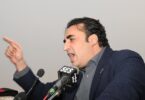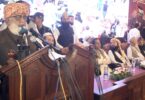ISLAMABAD (APP): The Supreme Court on Wednesday adjourned hearing on Presidential reference seeking its opinion on Article 63-A of the Constitution till Thursday.
A five-member larger bench of the apex court headed by Chief Justic Umar Ata Bandial and comprising Justice Ijaz Ul Ahsan, Justice Muneeb Akhtar, Justice Mazhar Alam Khan Miankhel and Justice Jamal Khan Mandokhel heard the Presidential reference.
During the course of proceedings, Advocate Farooq H Naek counsel for the Pakistan Peoples Party (PPP) said that Article 58-(2)-B was abrogated in 1997 through the 13th Amendment but was brought back by former President Pervez Musharraf through Legal Framework Order (LFO) 2002. He said that the the Pakistan People Party (PPP) again removed Article 58-(2)-B through the 18th Constitutional Amendment in 2010.
Naek said that the Article 63-A was made a part of the Constitution through the 14th Amendment and it gave broad powers to party heads.
He said that the Election Commission of Pakistan (ECP) did have not have the authority to reject the party head’s decision prior to a presidential order amending Article 63-A in 2002 that reduced the powers of party heads.
He said that the 18th Amendment further reduced the powers of party heads and transferred them to the parliamentary leaders of the parties and after the amendment in Article 63-A, the authority to make the final decision was given to the Supreme Court.
Naek said that according to the 18th Amendment, the authority to make a decision on a reference related to Article 63-A was given to the ECP. The amendment also bound the ECP to announce a decision within a month, he added.
He said that the presidential reference seeking the court’s opinion was only related to sub-clause 4 of Article 63-A.
Justice Ijaz Ul Ahsan pointed out that Article 62(1)(f) did not specify the length of disqualification but its interpretation was provided by the apex court.
Naek responded that Parliament had not determined the length of disqualification for defecting lawmakers under Article 63-A.
The Chief Justice said that Article 63-A made loyalty conditional on party policy on four occasions and loyalty was a basic constitutional principle. The purpose of Article 63A was to ensure loyalty to the party, he added.
Justice Ijaz said that ticket holders swear in their nomination papers that they would not deviate from party policy.
Naek said that the rules for punishing a party worker for violating party discipline were underlined in A-rticle 63-A. He said whet-her it was dishonesty or disloyalty, the consequences of both were underlined in the Constitution.
He said that a dissident party member would effectively lose his seat.
Justice Munib Akhtar said that not abiding by one’s oath amounted to dishonesty. He said that a dissident membrmer was elected on a ticket from a particular political party.
He said that deviation from the party had been called a cancer.
The Chief Justice said that during the attorney general’s arguments, the court was told that Article 63-A was related to loyalty.
He said Article 5 stated that every party member should be loyal to the state. He said that disqualification was a minor matter.
He said that the basic purpose of Article 63-A was to ensure loyalty to the party. When a member stated he was part of a particular party in his oath, that meant he was bound by the party policy, he added.
Naek said that a party worker was not a slave that he would listen to all directives.
Upon this, Justice Ahsan asked whether government employees would be considered slaves. All parties had some rules and regulations which must be followed.
Justice Ijaz said that Articles related to the qualification and disqualification of a lawmaker were not a wall of fire.
Naek said that loyalty only existed within the monarchy. He said that the people should be allowed to decide who to elect.
Justice Ijaz then asked whether Articles 62 and 63 should be removed from the Constitution.
Justice Mandokhail said that a big punishment such as disqualification could not be handed down without a trial.
He said that an independent candidate who joined the party after winning did not take an oath swearing allegiance to the party.
Naek said that no party member took an oath to obey all the directives of the party chief.
Justice Ijaz said that political parties were the backbone of the parliamentary system.
He asked how could the system be run where the backbone was plagued by cancer?Naek said dissident members were de-seated but not disqualified.
The chief justice observed that Article 63-A had been invoked in only one instance since 1998 which meant that it was not taken seriously by party heads. He said why defecting lawmakers were later welcomed back to the party’s folds. The reason was the flexibility in politics, he added.
Naek responded that rigidity in politics led to chaos.
Justice Munib asked Naek whether a lawmaker who had been de-seated could contest by-elections to which the counsel replied in the affirmative and said that the punishment for someone who deviated was that he was de-seated.
Justice Ijaz asked Naek whether disloyalty was not dishonesty? He asked whether a lawmaker could be disqualified over dishonesty.
Naek replied that disloyalty was a strong word and it was not mentioned in Article 63-A.
The Chief Justice said if a person was disqualified for dishonesty, he was also disqualified for the next election.
After completion of arguments by Advocate Farooq H Naek, Advocate General of Sindh Salman Talibuddin said that lawmakers who sold their votes for money could be asked to resign.
He said that the court was being unnecessarily dragged into politics. He said that Article 63-A was a step towards mature democracy.
After the arguments of Advocate General Sindh, the Chief Justice asked whether Babar Awan would give arguments.
Ali Zaffar said that Babar Awan would raise some points on the constitutional petition.
The Chief Justice said that while deciding on a case related to Article 63-A, the court could ask several questions. He said that the court could asked whether a vote been cast against party lines or had the lawmaker deviated from party policies?
He further asked could the court determine anything if a vote was casted against party lines.
Advocate Raza Rabbani said that he would answer these questions of the court tomorrow (Thursday).






